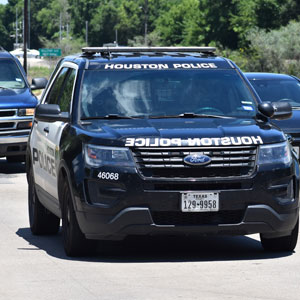
Why You Might Get Pulled Over—And What To Do If It Happens
In Texas, police generally need a warrant to detain or arrest someone, but there are exceptions—especially when an officer witnesses an offense firsthand. This means that if you commit even the smallest traffic violation, an officer has the right to pull you over. Some common reasons include:
- Speeding
- Failing to maintain a single lane
- Not signaling 100 feet before a turn
- Rolling through or stopping just past a stop line
- Any other minor traffic infraction
If you are pulled over, knowing what to expect can make a big difference. First, the officer will ask for your driver’s license and proof of insurance. Then, they will likely engage you in conversation—sometimes friendly, sometimes more probing.
If the officer smells alcohol on your breath or suspects you are impaired based on any erratic driving behavior, they will ask you to step out of the vehicle and begin a DWI investigation.
The Questions You Can Expect From Officers During A DWI Stop
Once you are pulled over, the officer will likely start by asking basic questions, such as:
- “Where are you coming from?”
- “Where are you headed?”
If the officer suspects alcohol is involved, they will move forward with a more detailed line of questioning, such as:
- “Have you been drinking?”
- “How much have you had to drink?”
- “When did you have your last drink?”
At this point, they may ask you to perform field sobriety tests to further assess whether you are under the influence.
The Top Three Field Sobriety Tests Used In Texas
In Texas, there are three main field sobriety tests officers use to determine whether someone is intoxicated:
1. Horizontal Gaze Nystagmus (HGN) Test
This test measures the involuntary jerking of the eyes, which can indicate intoxication. The officer holds a stimulus, such as a pen or finger, about 9 inches away from your face and moves it side to side.
You will be asked to follow the movement with your eyes. Meanwhile, the officer looks for six clues—three in each eye—by checking each eye twice during 12 total passes. Involuntary jerking of the eyes while following the stimulus is a key indicator the officer is looking for.
2. The Walk-And-Turn Test
This test evaluates your ability to follow instructions and maintain balance. The officer will ask you to stand with one foot in front of the other, arms at your sides, and not to move until instructed. However, the test technically begins at this point, as the officer is already observing your balance and whether you start too soon.
Once the test officially begins, you are instructed to take nine heel-to-toe steps along a straight line, turn in small steps, and walk nine steps back in the same heel-to-toe manner. The officer will look for a variety of signs that may indicate intoxication, such as:
- Starting the test before being told
- Failing to maintain the initial stance during instructions
- Taking the wrong number of steps
- Failing to touch heel-to-toe
- Using arms for balance
- Stepping off the line or turning incorrectly
3. The One-Leg Stand Test
In this test, the officer will ask you to raise one foot approximately 6 inches off the ground while keeping your arms at your sides. You will be asked to hold this position for 30 seconds while counting out loud. The officer is looking for four specific clues:
- Putting your foot down during the test
- Using arms for balance
- Swaying while balancing
- Hopping to maintain balance
4. Alternative Field Sobriety Tests
If someone cannot perform the walk-and-turn or one-leg stand tests due to physical limitations, officers may use any of these alternative field sobriety tests:
- Finger Count Test: You are asked to touch your thumb to each finger while counting up and down (1, 2, 3, 4, then 4, 3, 2, 1) four times.
- Romberg Test: You close your eyes, tilt your head back, and estimate when 30 seconds have passed.
- Alphabet Test: The officer will ask you to recite part of the alphabet, starting at a specific letter and stopping at another.
Know Your Rights When Stopped And Detained
During a traffic stop or detention, you have several important rights. Exercising these rights does not prevent an arrest, but it does require the officer to take additional legal steps, such as obtaining a warrant.
- Right To Remain Silent: You are not obligated to answer an officer’s questions if you choose not to. You can politely decline to provide information beyond basic identification.
- Right To Refuse A Field Sobriety Test: You can refuse to participate in any field sobriety tests, such as walking in a straight line or standing on one leg.
- Right To Refuse A Chemical Test: You can refuse to provide a blood or breath sample when requested. However, refusing a field sobriety test often leads to additional steps. If you decline to participate, the officer will likely request a blood or breath sample instead. If you refuse to provide a blood or breath specimen, the officer can obtain a warrant to take a blood sample, and you may still be arrested for DWI.
Still Have Questions? Ready To Get Started?
For more information on DWI Investigations In Texas, an initial strategy session is your next best step. Get the information and legal answers you are seeking by calling (361) 882-7788 today.
